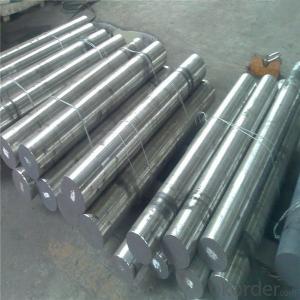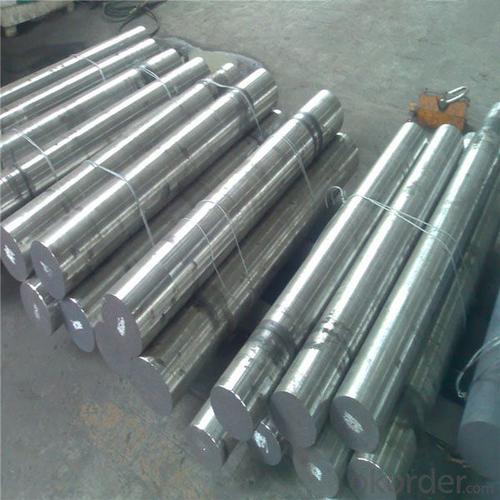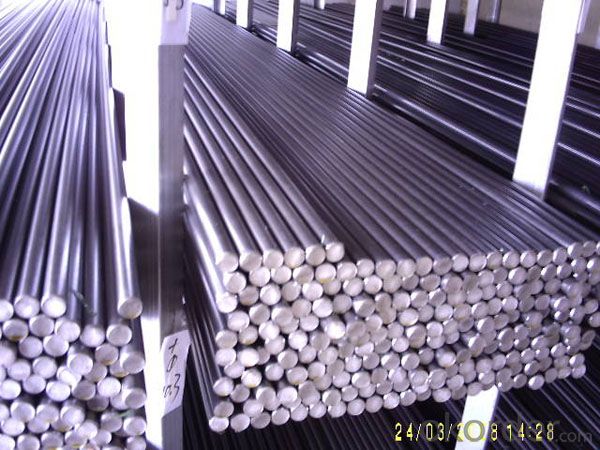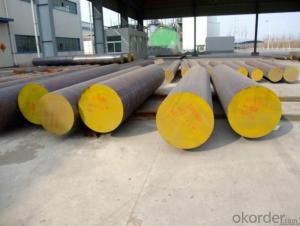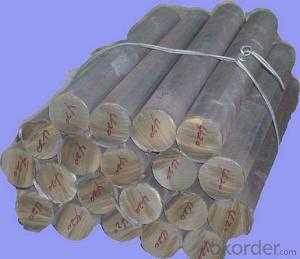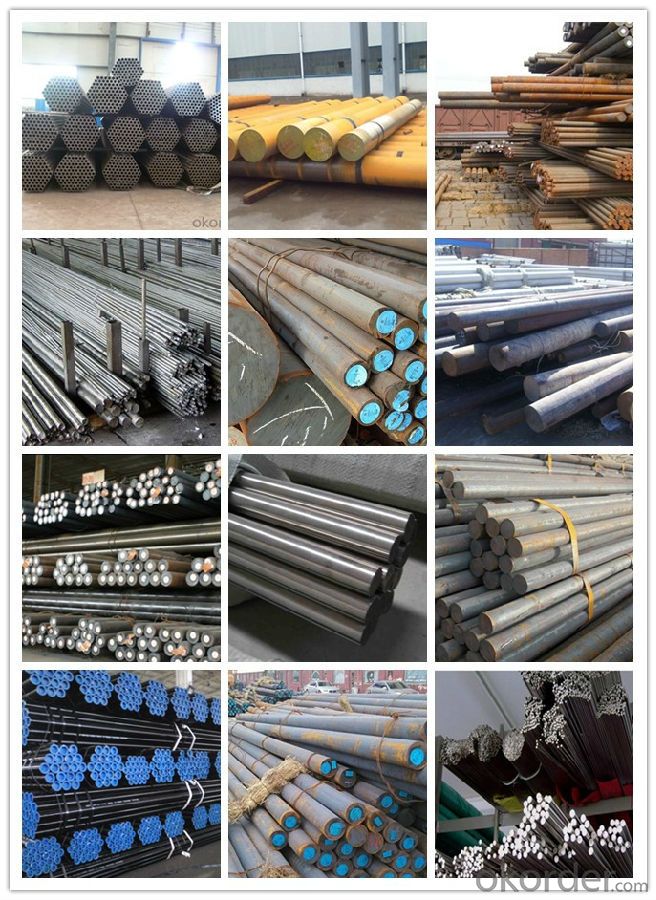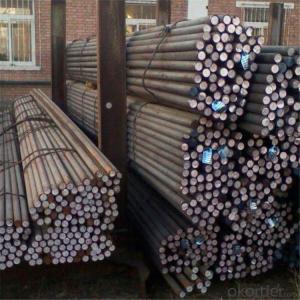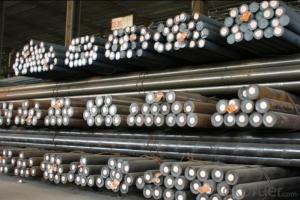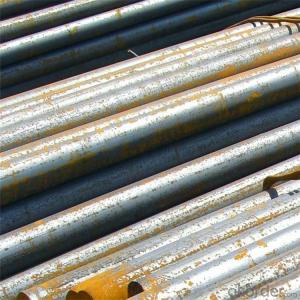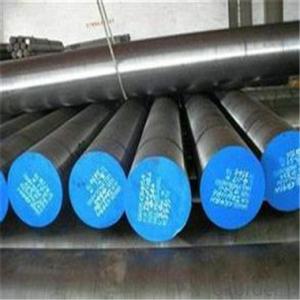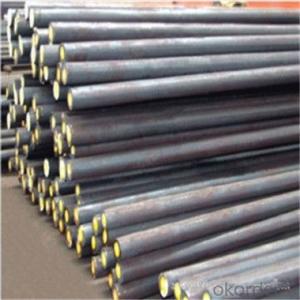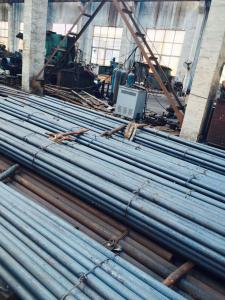Special Steel S45C Cold Drawn Steel Round Bar
- Loading Port:
- China main port
- Payment Terms:
- TT OR LC
- Min Order Qty:
- 30 m.t.
- Supply Capability:
- 10000 m.t./month
OKorder Service Pledge
OKorder Financial Service
You Might Also Like
Specification
Product information
MAIN SPECIFIATION | ||
PRODUCTS | SIZE | USAGE |
Hot Rolled Round Bar | SIZE :Φ16-Φ150mm | BAR |
WEIGTH:1.0-5.0t | FLANGE | |
LENGTH:6-12m | EQUIPMENT MANUFACTUR | |
Forged Steel Bar | SIZE:Φ150-Φ300mm | BAR |
FLANGE | ||
WIRE | SIZE:Φ5.5-Φ18mm WEIGHT:1-2t | STANDARD |
THREADLET | ||
WIRE ROD | ||
Continuously Cast Bloom | Section:150²-220x260mm Φ180-Φ240mm | Hot Rolled Bar,Wire,Shapes |
LENGTH:6-9m | PIPE | |
STEEL BAR | SIZE:12"-25" | FORGED |
1.Grade:Austenitic Stainless steel 301,304,304cu, 301L,304N,310S,316,316L,316Ti,316N,317,317L,321,347,347H
Alloy steel : scm415,scm 420H ,scm435 ,s45c ,15Mrco ...
2.Standard: AISI, ASTM, DIN, GB, JIS
3.Shape:Round.
4.Diameter:10-415 mm.
5.Length:3---12 m.
6.Surface:Bright(cold drawn,smooth turned) or Black(Hot rolled, hot forged)
7.Procedure:rew elements(C,Fe,Ni,Mn,Cr,Cu.)---Smelted ingots by AOD finery---hot rolled into black suface---pickling in acid liquid---cold drawn----polished by automatically machine---cutting into pieces---checking quanlity---package.
8.Application:Architecture,Food,Chemical,shipping industry.
9.Certifacate:ISO 9001:2008, TUV Rheinland, Bureau Veritas.
Product show
Workshop show
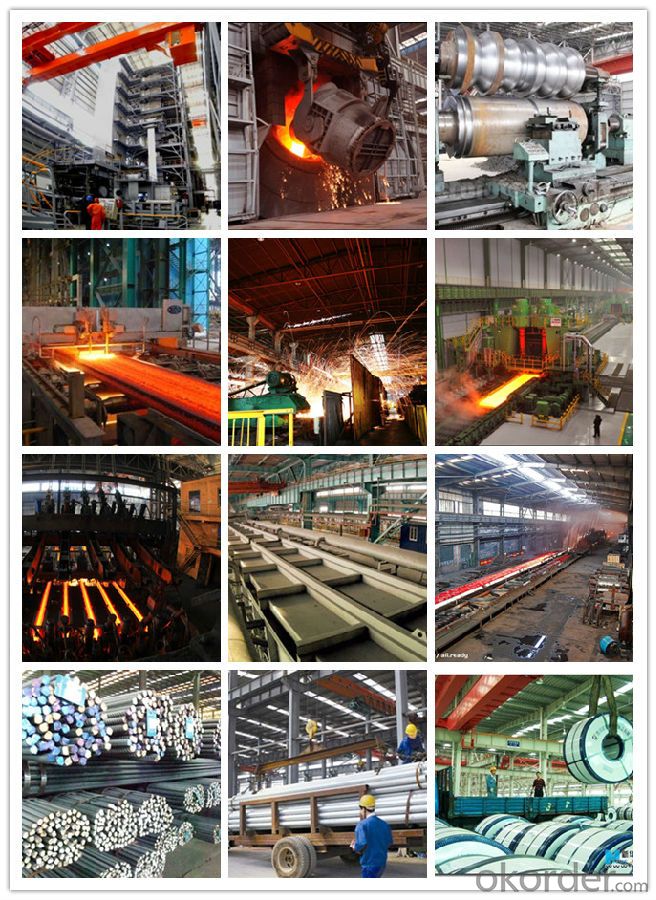
Shipping
1. FedEx/DHL/UPS/TNT for samples, Door-to-Door;
2. By Air or by Sea for batch goods, for FCL; Airport/ Port receiving;
3. Customers specifying freight forwarders or negotiable shipping methods!
Delivery Time: 3-7 days for samples; 5-25 days for batch goods.
Payment Terms
1.Payment: T/T, L/C, Western Union, MoneyGram,PayPal; 30% deposits; 70% balance before delivery.
2.MOQ: 1pcs
3.Warranty : 3 years
4.Package Informations: 1) EXPORT, In 20 feet (GW 25 ton) or 40 feet Container (GW 25 ton)
2)as customer's requirement
Why choose us?
(1) The leading exporter in China special steel industry.
(2) Large stocks for various sizes, fast delivery date.
(3) Good business relationship with China famous factories.
(4) More than 7 years steel exporting experience.
(5) Good after-sales service guarantee.
- Q: How does special steel contribute to the food processing industry?
- Special steel, with its unique properties and characteristics, plays a crucial role in the food processing industry. It is widely used in various equipment and machinery for processing, handling, and packaging food products. Special steel's corrosion resistance, high strength, and durability ensure that the equipment remains hygienic, safe, and reliable throughout its lifespan. Additionally, special steel's heat resistance makes it suitable for applications that involve high temperatures such as ovens, grills, and industrial cookware. In summary, special steel's contribution to the food processing industry lies in its ability to provide the necessary strength, resilience, and hygiene required for efficient and safe food production and processing.
- Q: What are the different methods of measuring the hardness of special steel?
- There are several methods available for measuring the hardness of special steel. These methods can be categorized into two main categories: destructive and non-destructive testing. 1. Rockwell Hardness Test: This is a widely used destructive testing method that measures the depth of penetration of an indenter into the steel surface. The Rockwell hardness test provides a hardness value based on the resistance of the steel to indentation. It is a simple and quick method that requires minimal sample preparation. 2. Brinell Hardness Test: Another destructive testing method, the Brinell hardness test, involves applying a known load to a hardened steel ball and measuring the diameter of the indentation left on the steel surface. The hardness value is determined based on the ratio of the applied load to the surface area of the indentation. 3. Vickers Hardness Test: This is a micro-indentation test that utilizes a diamond pyramid-shaped indenter. The Vickers hardness test measures the diagonal length of the indentation left on the steel surface and calculates the hardness value based on the applied load. 4. Knoop Hardness Test: Similar to the Vickers test, the Knoop hardness test is a micro-indentation method that uses a diamond pyramid-shaped indenter. However, instead of measuring the diagonal length of the indentation, it measures the length of the long axis. This test is particularly useful for measuring the hardness of thin steel samples or steel coatings. 5. Ultrasonic Hardness Test: This non-destructive testing method measures the hardness of steel by analyzing the propagation of ultrasonic waves through the material. The hardness value is determined based on the correlation between the velocity of the waves and the hardness of the steel. 6. Magnetic Hardness Test: This non-destructive testing method utilizes magnetic properties to measure the hardness of steel. It involves applying a magnetic field to the steel and measuring the magnetic response. The hardness value is determined based on the correlation between the magnetic response and the hardness of the steel. It is important to note that each method has its advantages and limitations, and the choice of method depends on factors such as the type of steel, the required accuracy, the sample size, and the available equipment and expertise.
- Q: How does special steel perform in aerospace applications?
- Special steel is widely used in aerospace applications due to its exceptional performance and unique properties. One of the key reasons for its usage is its high strength-to-weight ratio, which is crucial in the aerospace industry where weight reduction is a primary concern. Special steel alloys exhibit superior strength, allowing them to withstand the extreme conditions encountered during flight, such as high temperatures, vibrations, and pressure changes. Additionally, special steel possesses excellent resistance to corrosion, making it an ideal choice for aerospace applications where exposure to moisture and various chemicals is common. Its corrosion resistance ensures the longevity and durability of critical components, reducing maintenance and replacement costs. Furthermore, special steel offers excellent fatigue resistance, meaning it can withstand repeated loading and unloading cycles without experiencing deformation or failure. This property is vital in aerospace applications where components are subjected to cyclic stresses and must maintain their integrity over prolonged periods. Moreover, special steel alloys can be easily fabricated and machined, allowing for the production of complex and precise aerospace components. The ease of fabrication ensures efficient manufacturing processes and the ability to create intricate designs, which is essential for optimizing performance and aerodynamics. Overall, special steel's exceptional strength, corrosion resistance, fatigue resistance, and ease of fabrication make it an invaluable material in aerospace applications. Its utilization in critical components, such as turbine blades, landing gears, and structural elements, ensures the safety, reliability, and efficiency of aerospace systems.
- Q: How is the quality of special steel ensured?
- The quality of special steel is ensured through a combination of rigorous testing, strict quality control measures, and adherence to international standards and specifications. Special steel producers employ various methods such as chemical analysis, mechanical testing, and non-destructive testing to verify the composition, strength, and integrity of the steel. Additionally, special steel manufacturers often have dedicated quality assurance teams that closely monitor the production process to identify any potential issues and ensure the final product meets the required specifications.
- Q: How does special steel contribute to the automotive suspension industry?
- Special steel contributes to the automotive suspension industry by providing high strength and durability to suspension components. It allows for lighter and more efficient designs, improving handling, stability, and overall performance of vehicles. Special steel also enhances safety by increasing the ability to absorb and dampen shocks and vibrations, resulting in a smoother and more comfortable ride for passengers.
- Q: How does special steel contribute to the aerospace noise reduction?
- Special steel contributes to aerospace noise reduction by providing high strength and durability, which allows for the construction of lighter and more aerodynamic aircraft components. This reduces the overall weight of the aircraft, leading to decreased fuel consumption and noise emissions. Additionally, special steel's unique properties, such as its ability to dampen vibrations and resist corrosion, help to minimize the transmission of noise and vibrations throughout the aircraft structure, resulting in a quieter and more comfortable flying experience for passengers and crew.
- Q: How does special steel perform in cryogenic toughness?
- Special steel has gained recognition for its outstanding performance in cryogenic toughness. Unlike regular steel, which significantly loses its toughness when exposed to extremely low temperatures, special steel is specifically designed to withstand such extreme conditions and maintain its toughness and ductility. The composition and microstructure of special steel are carefully engineered to ensure its high performance in cryogenic environments. Through a unique combination of alloying elements and heat treatment processes, special steel can resist brittle fracture and retain its strength even at temperatures as low as -196 degrees Celsius (-321 degrees Fahrenheit). The exceptional cryogenic toughness of special steel makes it an ideal choice for a range of applications, including the storage and transportation of liquefied natural gas (LNG), aerospace engineering, and medical equipment used in cryogenic medicine. It provides the necessary reliability and safety when subjected to extreme cold temperatures, ensuring the integrity and functionality of the materials and structures it is employed in. In conclusion, special steel's exceptional performance in cryogenic toughness distinguishes it from regular steel, making it the preferred choice for applications that demand reliable and durable materials in extremely low-temperature environments.
- Q: What are the potential health hazards associated with working with special steel?
- The potential health hazards associated with working with special steel include exposure to toxic fumes and dust, which can lead to respiratory problems such as asthma or lung damage. Skin contact with certain types of special steel may cause irritation or allergic reactions. Additionally, the physical nature of the work, such as heavy lifting or repetitive motions, can contribute to musculoskeletal disorders and injuries. Proper safety measures, such as wearing appropriate protective equipment and ensuring proper ventilation, are crucial in minimizing these health risks.
- Q: Can special steel be used in the musical instrument manufacturing industry?
- Yes, special steel can be used in the musical instrument manufacturing industry. It can be utilized for various components of musical instruments, such as strings, keys, and structural parts, to enhance durability, tone quality, and overall performance.
- Q: Can special steel be coated or plated?
- Yes, special steel can be coated or plated to enhance its properties or provide additional protection against corrosion or wear.
Send your message to us
Special Steel S45C Cold Drawn Steel Round Bar
- Loading Port:
- China main port
- Payment Terms:
- TT OR LC
- Min Order Qty:
- 30 m.t.
- Supply Capability:
- 10000 m.t./month
OKorder Service Pledge
OKorder Financial Service
Similar products
Hot products
Hot Searches
Related keywords
